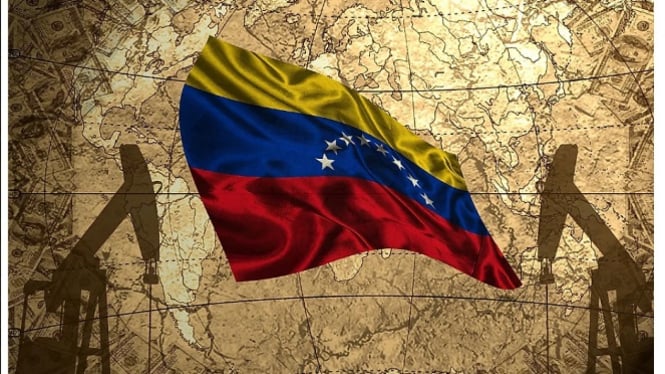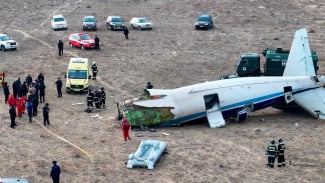List of Countries with Largest Oil Reserves in the World
VIVA – Oil is one of the most important commodities across all major industries in the world. Used for things like heating systems in homes, running vehicles, and even electricity, global oil consumption reaches 97 million barrels every day.
Formed through a process that lasts millions of years, oil is a fossil fuel. Specifically, as organic materials like plants and animals decompose underground, they mix with sediments in the soil. Over the years, high temperatures and pressures mold these remains
Over the years, high temperatures and pressures mold these remains into oil and gas. So, when large amounts of oil form in one location, they create "oil reserves".
Oil reserves are an estimate of the amount of crude oil located in a certain area. Due to the immense value of oil as well as its limited quantity, these oil reserves are extremely valuable and important to any country.
1. Venezuela (303,806 billion barrels)
Venezuela
Venezuela has the largest oil reserves in the world, but the development of its energy sector has been complicated by the country’s political crisis in recent years. In one striking example earlier this month, tanks at a Venezuelan oil facility burst, leaking crude for four days. Workers blamed a lack of investment and poor maintenance of the country’s oil infrastructure.
2. Saudi Arabia (258,600 billion barrels)
The Kingdom is home to state energy giant Saudi Aramco, which successfully listed on the Saudi Stock Exchange (Tadawul) last year, becoming the world’s most valuable company. Aramco is also the world’s most profitable company and pumps more oil daily than any other producer.
3. Iran (208,600 billion barrels)
Iran’s economy has been battered by the coronavirus pandemic amid a broadening recession. US sanctions on the country’s oil industry have also hit the sector particularly hard, drying up foreign investment and disrupting major business deals.
In January, the Institute of International Finance (IFF), a global trade group of financial institutions, estimated that Iran’s crude oil exports had dropped over 85 percent to 0.4 million barrels per day (BPD) from highs of 2.8 million BPD in May 2018.
4. Canada (170,300 billion barrels)
Bendungan Daniel Johnson, Kanada
- Twitter @VantageDC
One of Canada's most important economic resources is petroleum. Large oil reserves have placed Canada among the world's leading oil producers and exporters.
More than 95% of these reserves are in oil sand deposits in Alberta, a province that has almost all of Canada's oil sands and most of its conventional oil reserves. Saskatchewan and Newfoundland also have large oil reserves and oil production plants.
The history of the country's oil industry can be traced back to 1858 when James Williams dug the first oil well. Canada's oil industry rose to prominence alongside the US industry. Canada exports its oil in large quantities with one of the main export destinations being the US.
5. Iraq (145,019 billion barrels)
Iraq’s crude oil revenues fell by half in April due to the coronavirus pandemic, according to the country’s oil ministry. The crisis raises a particular problem for Iraq as its dwindling reserves mean officials are turning to deeply unpopular austerity measures, with the government considering cuts to social benefits and the country’s bloated public sector.
6. Kuwait (101,500 billion barrels)
Kuwait, salah satu negara yang tidak mewajibkan pajak atas warganya
- U-Report
Kuwait joined Saudi Arabia and the UAE in over-complying with the OPEC+ output cut agreement, meaning the countries are cutting output by a greater amount than had been agreed. Experts have suggested that this move will likely prevent global oil storage capacity from being completely exhausted a situation that would cause dramatic turmoil.
7. United Arab Emiratest (97,800 billion barrels)
The UAE emirate of Abu Dhabi is home to the vast majority of the country’s oil reserves. Dr. Sultan Ahmed Al Jaber, UAE Minister of State and Group CEO of the Abu Dhabi National Oil Company, ADNOC said earlier this month that oil markets would rebalance over time, noting that demand will return as the coronavirus pandemic recedes but that “this will take time.”
8. Russia (80 billion barrels)
Russia is an important ally of OPEC and part of the OPEC+ group. In March, the country’s decision to not support oil output cuts in the face of falling demand due to the coronavirus pandemic precipitated a price war. Russia has since reversed course and joined in cutting output.
9. Libya (48,363 billion barrels)
Libya is home to Africa’s largest proven oil reserves, but the industry has been pummeled by the country’s ongoing civil war. State oil producer National Oil Corporation (NOC) reported losses nearing $5 billion earlier this week as a result of the closure of oil assets by General Khalifa Haftar’s forces earlier this year.
The closure denies a key source of revenue to the Government of National Accord (GNA), led by Prime Minister Fayez al-Sarraj and backed by Turkey with links to extremist militias. Funds from oil production
10. United States (47,107 billion barrels)
US oil production has skyrocketed in recent years as shale oil fracking technology has allowed companies to access reserves. Shale oil companies, however, have been pushed to the brink by the coronavirus crisis. Production has been significantly cut, but some producers have been bullish about the situation, noting that an oil price of merely $30 per barrel would be enough to start fracking new wells.































